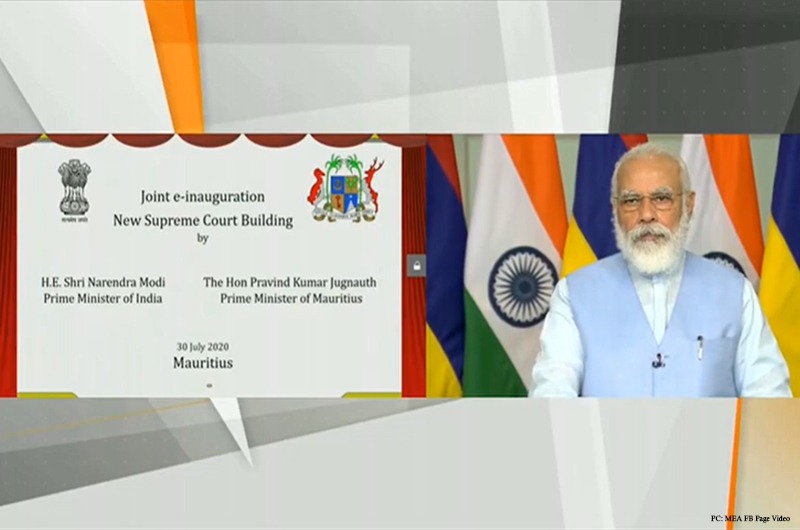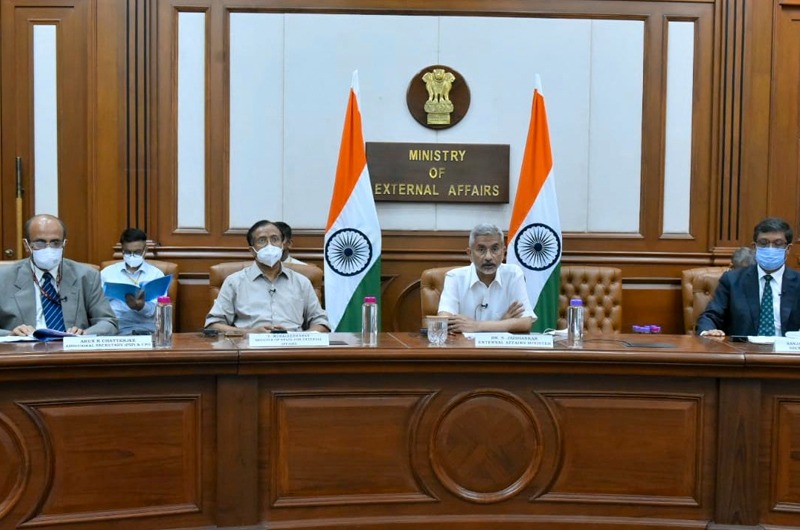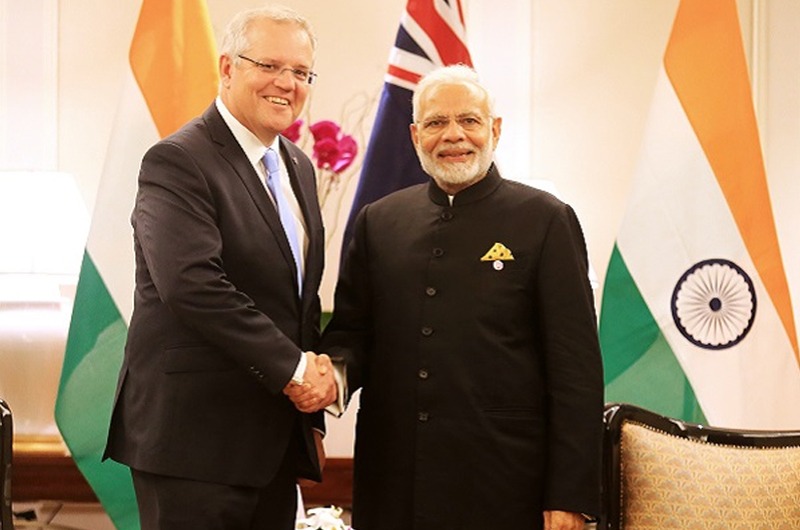With an area of 30,528 square kilometres and a population of approximately 11 million people, Belgium is a small country located in Western Europe. Belgium is headquarters of the European Union and NATO. Along with Netherlands and Luxembourg, Belgium forms the group known as Benelux group of states. It is one of the influential and prosperous member states of the European Union. It has a well-developed infrastructure, a strong and high-tech export oriented economy of which 75 percent is contributed by the services sector.
The diplomatic relations between India and Belgium were established in 1947 after India gained independence from the British. Belgium was one of the first countries in the western world with whom India established diplomatic relations after independence. The year 2017, will mark the 70th anniversary of the diplomatic relations between Belgium and India. Belgium has supported India on many of its political and strategic objectives. Belgium has also supported Indian’s candidature for permanent membership of the UN Security Council and has also supported the Nuclear Supplier’s Group (NSG) waiver in 2008. Both India and Belgium share common values and respect human rights. Both are vibrant democracies which believe in fundamental values of human dignity, respect, harmony and integration. Prime Minister Narendra Modi visited Belgium, in the month of March 2016. Prime Minister’s visit to Brussels in Belgium on 30th March was his first official visit to Belgium after assuming the office. The PM has already made state visits to Europe, these are to France (9–12 April, 2015), Germany (12–14 April, 2015), Ireland (23 September, 2015), the UK (12- 14 November, 2015).
The visit to Belgium was significant as it included two separate visits and two separate summit meetings scheduled in the space of one day. One being the Prime Minister’s first bilateral summit meeting with Belgium and the other was the 13th India-EU Summit meeting. During the visit PM Modi expressed his grief and deep condolences to the families of those who lost their near and dear ones in the terrorist strikes in Brussels on 22nd March attack. The PM said that India has been suffering from terrorism since last four decades and Indians can understand and share the pain. It is now the right time for international community to stand together against violent forces and evolve strategies to uproot terrorism once and for all. The PM during his address said that “as part of our efforts to respond to this common challenge we could resume discussions on a Mutual Legal Assistance Treaty. Negotiations on Extradition Treaty and a Treaty on Exchange of Sentenced Prisoners could be concluded expeditiously”. The PM also in his press statement reiterated that India and Belgium share a long history of friendship. He said “A hundred years ago, more than 130,000 soldiers from India fought in the First World War alongside your countrymen on Belgian soil. More than 9,000 Indian soldiers made the supreme sacrifice… Next year will mark the 70th anniversary of India-Belgium diplomatic ties. To celebrate this important milestone in our friendship, we look forward to welcoming His Majesty King Philippe of Belgium in India next year… A system of bilateral foreign policy consultations would recommend concrete ways to upgrade our partnership”.
Belgium is one of India’s important trading partners in the EU. The trade and economic relations between India and Belgium are strong. In fact it is second largest trading partner in the EU after Germany. India is Belgium’s second largest export destination after the United States outside of the EU. Most of this trade is in diamonds. In fact, more than 80 percent of our trade is diamond trade. The bilateral trade during January-September 2015 stood at €9.14 billion.
Of this, India’s export to Belgium was €3.19 billion and import was €5.95 billion. The major exports from India to Belgium
in 2015 were in the sectors of gems & jewellery (€1.45 billion), chemicals and chemical products (€370 million) and textiles (€315 million). The major import of India from Belgium in January- September 2015 were gems & jewellery (€4.76 billion), chemicals and chemical products (€259 million), machinery and engineering products (€246 million) and plastic and articles (€228 million). Almost 84 percent of the world’s rough diamonds pass through Antwerp in Belgium. Antwerp is today the world’s largest diamond trading centre with a turnover of over US$54 billion and 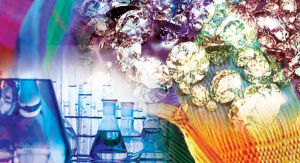 Indian traders own a large part of this diamond trade. India’s IT & Telecom sector is well represented in Belgium. Several Indian companies, particularly in the IT and software sectors, have established their bases in Belgium to cater to the Belgian as well as European markets. As per the data of National Bank of Belgium, Indian companies invested €80 million in Belgium in 2014. Apart from IT and Software sector large number of Indian companies in the chemicals sector have also established offices/warehousing facilities in Belgium, particularly near the port city of Antwerp. Belgian business interests in India cover dredging, chemicals, engineering goods, banking and finance, electronics and software, fertilisers, and biotechnology. On the other hand, Belgium has several competencies, which are of interest to India, such as port logistics, infrastructure, renewables, pharmaceuticals, chemicals etc.
Indian traders own a large part of this diamond trade. India’s IT & Telecom sector is well represented in Belgium. Several Indian companies, particularly in the IT and software sectors, have established their bases in Belgium to cater to the Belgian as well as European markets. As per the data of National Bank of Belgium, Indian companies invested €80 million in Belgium in 2014. Apart from IT and Software sector large number of Indian companies in the chemicals sector have also established offices/warehousing facilities in Belgium, particularly near the port city of Antwerp. Belgian business interests in India cover dredging, chemicals, engineering goods, banking and finance, electronics and software, fertilisers, and biotechnology. On the other hand, Belgium has several competencies, which are of interest to India, such as port logistics, infrastructure, renewables, pharmaceuticals, chemicals etc.
The cumulative Foreign Direct Investment (FDI) inflows from Belgium into India between April 2000 and September 2015 amounted to $855.30 million making Belgium the 22nd most important investor in India. Both India and Belgium are moving forward to establish business relations in the discussing the unconventional areas as well. The 14th Joint Economic Commission (JCM) meeting between India and BLEU (Belgium-Luxembourg Economic Union) took place on 28-29 September 2015 in New Delhi. Both sides discussed ways to enhance cooperation in areas such as renewable energy, life sciences, Ayurveda, consular access and higher education. There is an on-going cooperation between Ministry of Shipping of India and the Antwerp Port Authority of Belgium in the field of training. A MoU was signed between India and Antwerp Port on 12th February 2015 to enable Antwerp Port to organise training for Indian officials in Mumbai. The MoU is valid for five years. Apart from the trade agreements, yet another important framework agreement for cooperation in the field of Science and Technology was signed during the visit of the Belgian PM in November 2006 to India which established India-Belgium Joint Committee on S&T.
A large number of MoUs related to cooperation and mutual assistance in the field of space technology, renewable energy, field of health and education, have been signed. A list of major agreements between India and Belgium is provided in Table 1. Both sides have been consistently making efforts to maintain close relations and identify the ways to enhance cooperation in areas such as transport, infrastructure development, consular access, health, higher education, skill development, science & technology, market access, customs facilitation and measures to diversify bilateral trade. India has exhibited tremendous potential in last one-and-a-half decade and has become favourite destination for trade and investment. India is one of the most vibrant economies in the world registering more than 7 percent growth consistently since last decade.
A combination of expertise and capabilities of Belgium and potential of growth in India can deliver good dividends for both nations. There is a lot of scope for both nations to co-operate and associate with each other on the flagship development initiatives launched by Modi led NDA government such as Start Up India, Skill India, Digital India, Swaach Bharat, Smart City Projects and Make in India. Both the countries seem to be keen to further deepen the areas in which they are cooperating and are exploring potential areas for future association in different areas and sectors like political, security, trade, investment, energy, environment. India and Belgium are both functioning democracies. Both can cooperate and collaborate with each other to achieve goals of sustainable development.
By Dr Sheetal Sharma

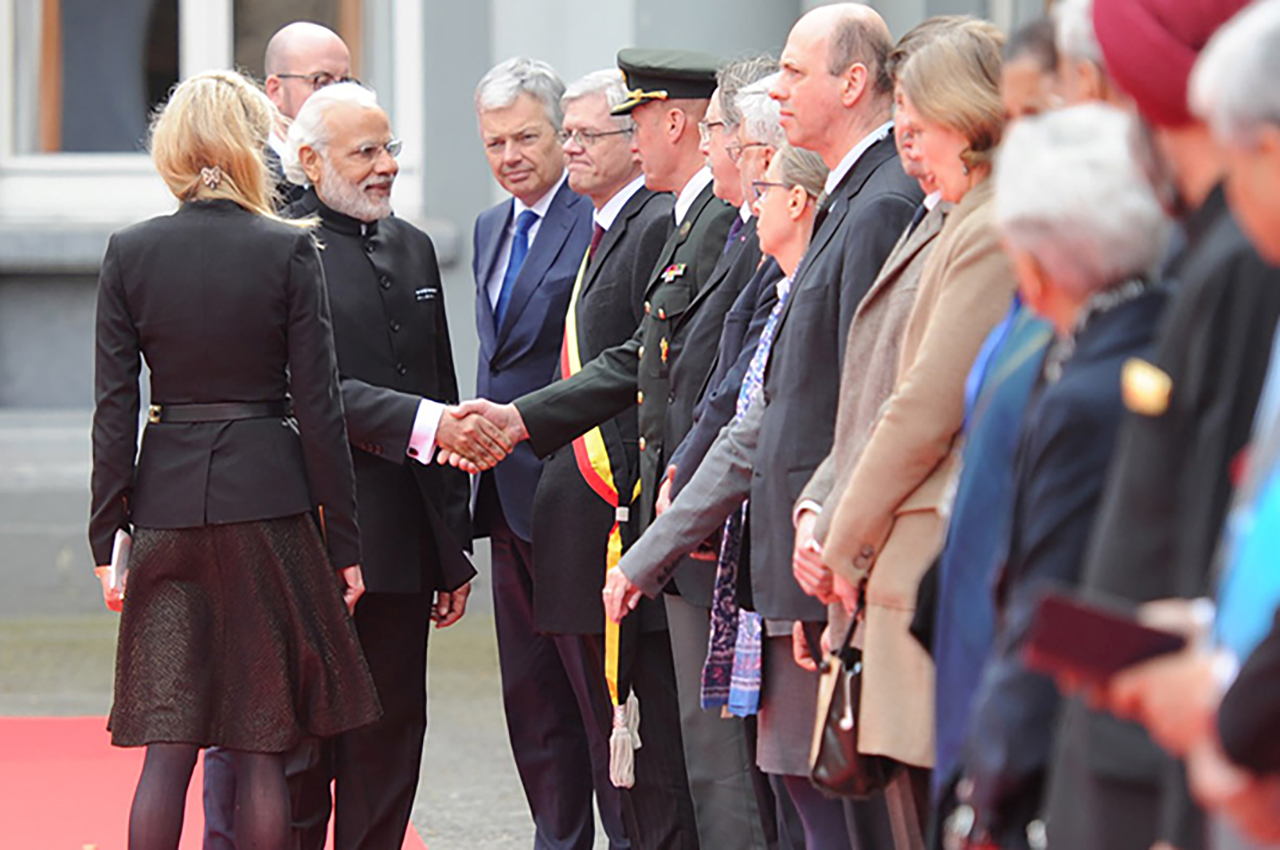
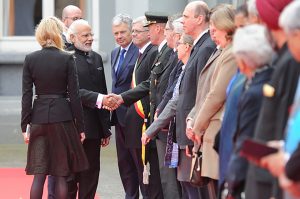
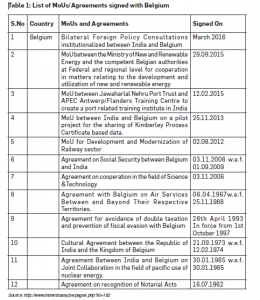 in 2015 were in the sectors of gems & jewellery (€1.45 billion), chemicals and chemical products (€370 million) and textiles (€315 million). The major import of India from Belgium in January- September 2015 were gems & jewellery (€4.76 billion), chemicals and chemical products (€259 million), machinery and engineering products (€246 million) and plastic and articles (€228 million). Almost 84 percent of the world’s rough diamonds pass through Antwerp in Belgium. Antwerp is today the world’s largest diamond trading centre with a turnover of over US$54 billion and
in 2015 were in the sectors of gems & jewellery (€1.45 billion), chemicals and chemical products (€370 million) and textiles (€315 million). The major import of India from Belgium in January- September 2015 were gems & jewellery (€4.76 billion), chemicals and chemical products (€259 million), machinery and engineering products (€246 million) and plastic and articles (€228 million). Almost 84 percent of the world’s rough diamonds pass through Antwerp in Belgium. Antwerp is today the world’s largest diamond trading centre with a turnover of over US$54 billion and 